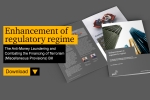Time to deliver
"We commend the Government’s effort to work within the existing fiscal constraints; however, we should be mindful of its recent practice to borrow off ‘balance sheet’ to fund its growth aspirations."

The Hon. Pravind Jugnauth, Minister of Finance and Economic Development painted a rather optimistic picture of the country’s performance, with some healthy fundamentals. In recent years, we have been accustomed to projects or measures being announced but being rolled over year after year and from one budget to another. Will this year be any different? Given that it is the penultimate year of this Government’s mandate, the pressure to deliver is mounting. The Government has resorted to some populist policies and, with many projects taking shape, it appears that economy is on the up.
GDP growth fell slightly short of expectations, with the economy growing at 3.9% for 2017/18 compared to the initial forecast of 4.1%. Delays in project implementation continue to constraint growth; out of the Rs18.8bn of public sector investment forecasted for 2017-18, only Rs13.6bn was actually spent.
However, the outlook for 2018-19 seems positive, with a number of both public and private sector projects having already started, or are scheduled to kick start in the year ahead. The smart cities (Cap Tamarin, Moka, etc.) or government projects such as the Metro-Express, A1-M1 bridge, Phoenix interchange or the sports complex at Cote-d’Or are all underway.
The Government did well to contain its recurrent expenditure against its initial estimate and to reduce the recurrent budget deficit. The delays in public investment has also meant that the overall budget deficit for 2017-18 was maintained at 3.2% of GDP. The deficit projection for 2018-19 continues to be supported by the availability of external grants and transfer from special funds, while public sector debt seems to be on a downward trend. However, the off “balance sheet” financing being used by the Government means that certain liabilities remain unrecognised and masks the country’s real debt position.

There was recent public outcry over the potential hike in water charges or petrol prices. If the population expects water 24/7, then they have to pay. However, the Government resisted against such an unpopular measure and has maintained water cost at its current low price. Further, with the huge investment in the road network, a system of free usage will be difficult to sustain and, unless car owners are discouraged, there will be little switching onto the Metro-Express once operational.
In the past, around 27% of the petrol taxes collected were used to fund road projects, specifically from the Build Mauritius Fund or Road Development Authority and financing through petrol taxes is likely to continue. The Government again decided to gain popular support by reducing petrol prices. At PwC, we estimate that this will cost nearly Rs1bn to the country and this money could have been better spent.
In terms of sectorial reforms, the integration of the global business sector and domestic economy is welcome and the changes to the tax framework are necessary to ensure that Mauritius is not only compliant with international norms, but also remains competitive. With sugar prices at its lowest, we were also expecting some radical announcements. Whilst the increase in custom duties to 80% alone may not be enough, this may help to soften the short-term challenges while the sector continues to reform and drive efficiencies. The sector however needs much more.
Although unemployment is on a downward trend, the low labour participation rate remains a concern, with the workforce representing only 47% of the total population compared to countries such as Singapore at 66%. The budgetary measures around gender mainstreaming may help to improve female participation.
The Budget also introduces new measures to attract foreign talents or high net worth individuals. However, the country continues to experience challenges in its ability to attract foreign talents and the current state of the labour market continues to impede on growth, especially as we look to diversify into new sectors such as AI, Fintech, etc. The proportion of foreign to local labour remains low at 6% (Singapore at 37%).
As in previous budgets, the digitalisation of public services remains an item on the agenda but we would have liked to see more. Driving national productivity through digitalisation, modern infrastructure and re-skilling of the workforce are key to building a competitive Mauritius.
Overall, the Government has resisted the temptation to hike taxes and implemented some measures to gain popular support. Whilst we commend the Government’s effort to work within the existing fiscal constraints, we should be mindful of its recent practice to borrow off “balance sheet” to fund its growth aspirations.















